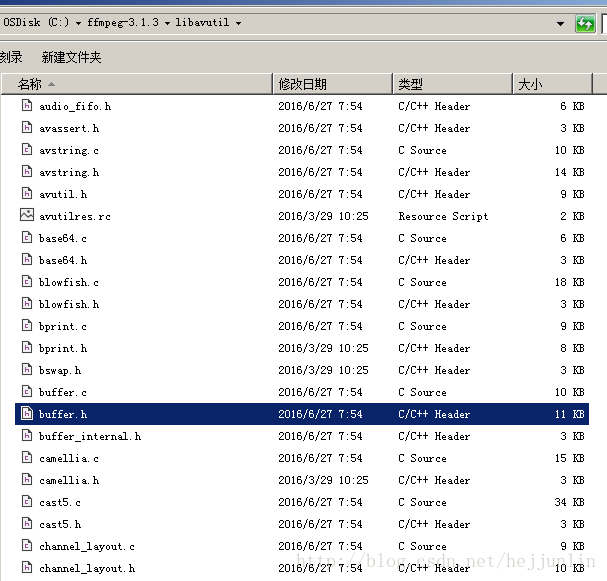FFmpeg总结(四)AV系列结构体之AVBuffer、AVBufferRef、AVBufferPool
位置:libavutil/buffer.h

AVBuffer采用引用计数的数据Buffer的API。
有两个核心对象这个API——AVBuffer和AVBufferRef。
AVBuffer代表数据缓冲区本身,它是私有的,不能直接被调用者调用。我们可以通过AVBufferRef,调用者须要检查两个AVBuffer指针是否指向两个不同的引用在同一数据buffer中。AVBufferRef 代表一个单个引用指向AVBuffer,调用者可以直接调它。
有两个功能函数提供创建一个AVBuffer对象在一个单引用中,av_buffer_alloc()分配置一个新buffer空间。av_buffer_create()负责包装已存在数组的AVBuffer对象。从一个已存在引用,其他的引用将创建通过av_buffer_ref()方法。
使用av_buffer_unref(),交释放这个引用(包含数据引用及计数引用)。
在已经存在的AVBuffer引用中,FFmpeg认为AVBuffer是可写入相关数据的。(不会被标识只读),av_buffer_is_writable() 函数提供是否可write的功能,如果不能将自动创建一个新的可写的buffer。
typedef struct AVBuffer AVBuffer;
/**
* A reference to a data buffer.
*
* The size of this struct is not a part of the public ABI and it is not meant
* to be allocated directly.
*/
typedef struct AVBufferRef {
AVBuffer *buffer;
/**
* The data buffer. It is considered writable if and only if
* this is the only reference to the buffer, in which case
* av_buffer_is_writable() returns 1.
*/
uint8_t *data;
/**
* Size of data in bytes.
*/
int size;
} AVBufferRef;
/**
* Allocate an AVBuffer of the given size using av_malloc().
*
* @return an AVBufferRef of given size or NULL when out of memory
*/
AVBufferRef *av_buffer_alloc(int size);
/**
* Same as av_buffer_alloc(), except the returned buffer will be initialized
* to zero.
*/
AVBufferRef *av_buffer_allocz(int size);
/**
* Always treat the buffer as read-only, even when it has only one
* reference.
*/
#define AV_BUFFER_FLAG_READONLY (1 << 0)
/**
* Create an AVBuffer from an existing array.
*
* If this function is successful, data is owned by the AVBuffer. The caller may
* only access data through the returned AVBufferRef and references derived from
* it.
* If this function fails, data is left untouched.
* @param data data array
* @param size size of data in bytes
* @param free a callback for freeing this buffer's data
* @param opaque parameter to be got for processing or passed to free
* @param flags a combination of AV_BUFFER_FLAG_*
*
* @return an AVBufferRef referring to data on success, NULL on failure.
*/
AVBufferRef *av_buffer_create(uint8_t *data, int size,
void (*free)(void *opaque, uint8_t *data),
void *opaque, int flags);
/**
* Default free callback, which calls av_free() on the buffer data.
* This function is meant to be passed to av_buffer_create(), not called
* directly.
*/
void av_buffer_default_free(void *opaque, uint8_t *data);
/**
* Create a new reference to an AVBuffer.
*
* @return a new AVBufferRef referring to the same AVBuffer as buf or NULL on
* failure.
*/
AVBufferRef *av_buffer_ref(AVBufferRef *buf);
/**
* Free a given reference and automatically free the buffer if there are no more
* references to it.
*
* @param buf the reference to be freed. The pointer is set to NULL on return.
*/
void av_buffer_unref(AVBufferRef **buf);
/**
* @return 1 if the caller may write to the data referred to by buf (which is
* true if and only if buf is the only reference to the underlying AVBuffer).
* Return 0 otherwise.
* A positive answer is valid until av_buffer_ref() is called on buf.
*/
int av_buffer_is_writable(const AVBufferRef *buf);
/**
* @return the opaque parameter set by av_buffer_create.
*/
void *av_buffer_get_opaque(const AVBufferRef *buf);
int av_buffer_get_ref_count(const AVBufferRef *buf);
/**
* Create a writable reference from a given buffer reference, avoiding data copy
* if possible.
*
* @param buf buffer reference to make writable. On success, buf is either left
* untouched, or it is unreferenced and a new writable AVBufferRef is
* written in its place. On failure, buf is left untouched.
* @return 0 on success, a negative AVERROR on failure.
*/
int av_buffer_make_writable(AVBufferRef **buf);
/**
* Reallocate a given buffer.
*
* @param buf a buffer reference to reallocate. On success, buf will be
* unreferenced and a new reference with the required size will be
* written in its place. On failure buf will be left untouched. *buf
* may be NULL, then a new buffer is allocated.
* @param size required new buffer size.
* @return 0 on success, a negative AVERROR on failure.
*
* @note the buffer is actually reallocated with av_realloc() only if it was
* initially allocated through av_buffer_realloc(NULL) and there is only one
* reference to it (i.e. the one passed to this function). In all other cases
* a new buffer is allocated and the data is copied.
*/
int av_buffer_realloc(AVBufferRef **buf, int size);
/**
* @}
*/
typedef struct AVBufferPool AVBufferPool;
/**
* Allocate and initialize a buffer pool.
*
* @param size size of each buffer in this pool
* @param alloc a function that will be used to allocate new buffers when the
* pool is empty. May be NULL, then the default allocator will be used
* (av_buffer_alloc()).
* @return newly created buffer pool on success, NULL on error.
*/
AVBufferPool *av_buffer_pool_init(int size, AVBufferRef* (*alloc)(int size));
/**
* Allocate and initialize a buffer pool with a more complex allocator.
*
* @param size size of each buffer in this pool
* @param opaque arbitrary user data used by the allocator
* @param alloc a function that will be used to allocate new buffers when the
* pool is empty.
* @param pool_free a function that will be called immediately before the pool
* is freed. I.e. after av_buffer_pool_can_uninit() is called
* by the pool and all the frames are returned to the pool and
* freed. It is intended to uninitialize the user opaque data.
* @return newly created buffer pool on success, NULL on error.
*/
AVBufferPool *av_buffer_pool_init2(int size, void *opaque,
AVBufferRef* (*alloc)(void *opaque, int size),
void (*pool_free)(void *opaque));
/**
* Mark the pool as being available for freeing. It will actually be freed only
* once all the allocated buffers associated with the pool are released. Thus it
* is safe to call this function while some of the allocated buffers are still
* in use.
*
* @param pool pointer to the pool to be freed. It will be set to NULL.
*/
void av_buffer_pool_uninit(AVBufferPool **pool);
/**
* Allocate a new AVBuffer, reusing an old buffer from the pool when available.
* This function may be called simultaneously from multiple threads.
*
* @return a reference to the new buffer on success, NULL on error.
*/
AVBufferRef *av_buffer_pool_get(AVBufferPool *pool);
/**
* @}
*/
#endif /* AVUTIL_BUFFER_H */AVBufferPool 是用来管理大buffer时的API
调用者必须使用av_buffer_pool_init()创建一个buffer池,无论什么时候需要,通过av_buffer_pool_get(),得到新buffer的引用,和av_buffer_alloc()非常像,当不被引用时,会重新归还给pool,而不用去像AVBuffer那样释放。当调用者不再分配新的buffer时,av_buffer_pool_uninit() 必须调用,表明这个pool将自动释放了(因为这个pool也是一个对象)。分配和释放buffer,是线程安全操作,只要保证没有其他默认alloc的callback在使用。这个结构体是私有的,不能直接被外部使用,外部可以用av_buffer_pool_init(),及av_buffer_pool_uninit()函数。